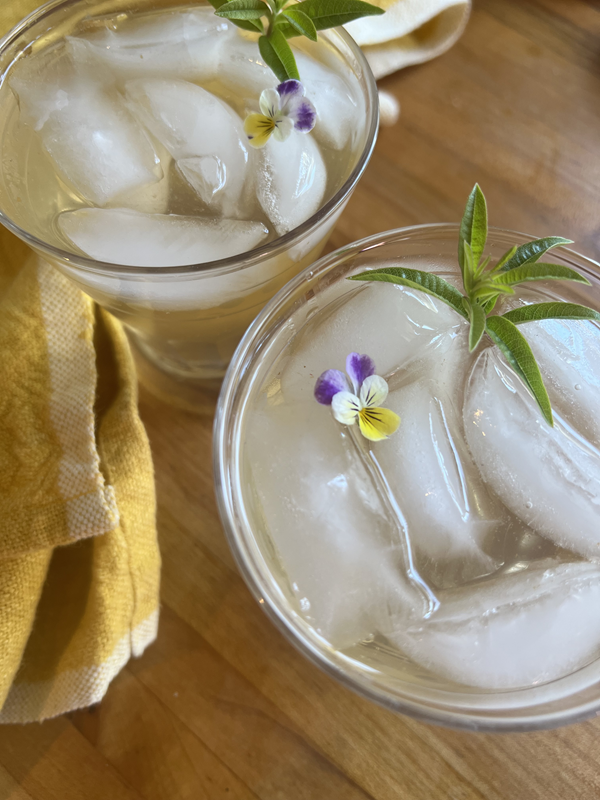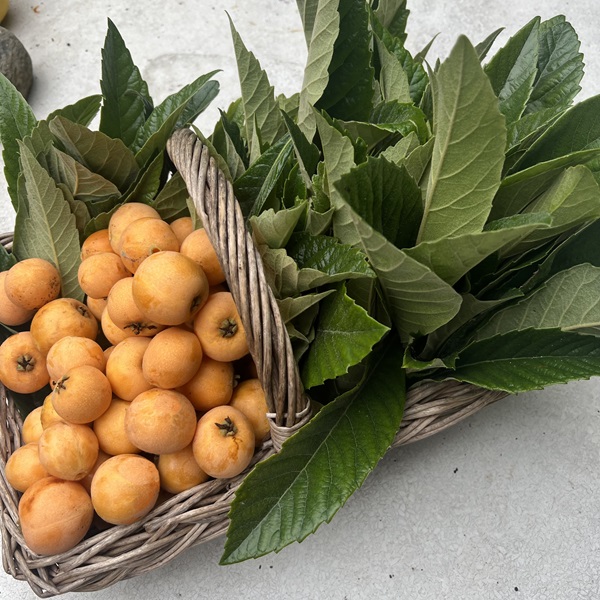Elevating Wellness in Late Summer
Taste the Sweetness of the Season with peach, lemon verbena, and loquat
Medicine Meal explores the intersection of food and herbs as medicine. The name comes from the Japanese Yakuzen culture, which is about creating delicious, healing meals using traditional Chinese medicine herbs and principles.
Late summer is a special fifth season, according to traditional Chinese medicine (TCM). Here, this short season includes the weeks of late July and August and is marked by blazing summer sun, bountiful gardens, and vibrant local farm stands. The rolling hills around us have become the honeyed color that our golden state was named after. In TCM, late summer is considered a profound time reflecting the nature of seasonal transitions in and around us.
Seasonal transitions are moments in the year when the body and mind are more susceptible to illness. In spring, they can manifest as seasonal allergies. In winter, we call it “cold and flu season.” The late summer season, however, has the greatest potential to reestablish profound wellness and set wellness goals and routines for the rest of the year.
The health of our digestion and muscles is represented in the late summer season. Thus, mindfulness, regular eating and staying active are key habits to balance the body and mind. Self-care and family care are particularly fruitful during this time, what we do now will reflect how we feel throughout the other seasons.
LATE SUMMER MEDICINE MEAL CHEAT SHEET
• Late summer foods lend themselves to a variety of interesting dishes. Explore the season’s bounty by shopping at your local farmers’ markets.
• Eat simple meals, eat moderately, and limit or omit refined sugar and sweeteners.
• According to TCM, seasonally beneficial foods include eggs, sweet potatoes, peas, apricots, green beans, melon, cherries, dates, apples, currants, figs, mulberries, carrots, squash, onions, oats, barley, millet, and chickpeas.
•The taste of late summer is sweet, which strengthens and nourishes the body and mind. Consider the natural sweetness of fruit, rice, grains, potatoes, and honey.
Peach Lemon Verbena Shrub
MAKES 10-12 DRINKS
This simple yet elegant recipe makes the most delicious non-alcoholic beverage. Shrubs are a vinegar-based drink that preserve the essence and flavor of fruits and herbs. My favorite blend uses lemon verbena, loquats from my garden, and peaches from Dry Creek Peach & Produce.1 Infused vinegars often steep for many weeks, but I appreciate having a simplified, overnight technique! Make sure to also try the seasonal shrubs at Ramen Gaijin2 in Sebastopol.
INGREDIENTS:
12 ounces (354 ml) champagne vinegar
1 cup fresh lemon verbena leaves
2 cups peaches, fresh and chopped
6 loquat fruits, halved and seeds removed (optional)
1-inch piece of fresh ginger root, thinly sliced
2 cups sugar
Sparkling water to taste
To make the vinegar, place the lemon verbena in a pint-sized jar (16 ounces) and pour the vinegar over the herbs until the jar is almost full (leaving 2 inches between the mixture and the top of the jar). Cover with a lid and let rest on your kitchen counter overnight. The next day, strain the herbs and discard them. Store the finished vinegar in a clean glass jar in a cool, dark place.
To make the fruit syrup, clean and rough chop the peaches and loquats (if using). Mix in the ginger and sugar. Cover with a lid or dishtowel and let rest on your kitchen counter overnight. The next day, strain the fruit syrup in a colander and press it out with the back of a wooden spoon. Discard the fruit and ginger root. Store the finished syrup in a clean glass jar in the fridge for up to a week.
To make the shrub, pour 1 ounce of lemon verbena vinegar and 1 ounce of fruit syrup into a glass over ice. Top with 4 ounces of sparkling water. Add more syrup if desired.
Loquat Cough Syrup
MAKES 6 CUPS
This cough syrup recipe is a spin on the classic loquat cough syrups you can find in Asian markets and herb shops. Loquat leaf is cooling, so it is best for coughs accompanied by or started with a fever. Loquat cough syrup is traditionally made using only the leaves; however, I add fresh loquat fruit for flavor when available.
INGREDIENTS:
4 cups (70 g) fresh loquat leaf, cut and loosely packed, or 2 cups dried loquat leaf
6 loquat fruits, halved and seeds removed
2-inch piece of fresh ginger, quartered
1 cinnamon stick
2 tsp vanilla
3 cups honey
Cheesecloth or fine mesh strainer
When harvesting loquat leaves, pick dark green leaves that do not have moldy, dark spots. Remove thick stems and cut the leaves into 1- to 2-inch pieces with scissors.
Place the loquat leaves, loquat fruit, ginger, cinnamon, and 12 cups (2.8L) water in a large pot and bring to a boil. Reduce heat to medium, stir, and slowly boil uncovered for one hour or until the liquid has reduced to 3 cups. Remove from heat and cool to lukewarm. Strain the mixture well through a fine mesh strainer or cheesecloth-lined colander. Discard spent leaves and herbs.
While still warm, add equal parts honey to the liquid mixture (3 cups) and mix until well incorporated. Cool completely and add vanilla. Store in glass jars in the refrigerator for up to 4 weeks or freeze for three months. It may be bottled and canned for long-term storage.
Note: The loquat leaves have tiny hairs that irritate the throat and must be removed by straining the liquid very well through a cheesecloth or fine mesh strainer.
Loquat syrup recipe excerpted from Asian American Herbalism: Traditional and Modern Healing Practices for Everyday Wellness by Erin Masako Wilkins. Published by Princeton Architectural Press, owned by Chronicle Books. Copyright © 2023 by Erin Masako Wilkins.
Erin Masako Wilkins is an Asian American herbalist, Japanese acupuncturist, and the author of Asian American Herbalism: Traditional and Modern Healing Practices for Everyday Wellness. She owns the online tea shop Herb Folk, teaches virtual and in-person workshops, and is faculty at the California School of Herbal Studies and Land of Verse.
Disclaimer: Be sure to identify plants properly when foraging for wild plants. Exercise caution and seek guidance from experienced foragers. Consult a qualified healthcare professional before taking new herbal supplements or changing your diet, especially if you are pregnant, nursing, immunocompromised, or on medication. As always, seek outside help if something doesn’t feel right for you.



